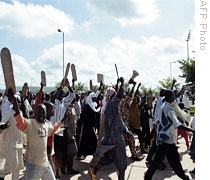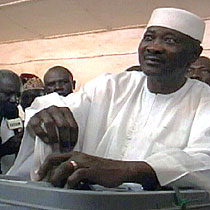Dakar
27 August 2009
 |
| Some 50,000 people demonstrate in Bamako to protest legislation that would boost women's rights in Mali, 22 Aug 2009 |
Tens of thousands of Malians have been holding protests and expressing outrage since the National Assembly adopted the new family code in early August.
The code's more than 1,100 new articles would have increased women's rights by reforming laws with regards to land ownership, inheritance, education, employment and marriage.
Supporters of the code, more than a decade in the making, praised it as enhancing the rights of women and girls, who they say have been traditionally viewed as second-class citizens.
Islamic leaders said the new code contains provisions that are an affront to the country's traditional values and religious beliefs. They had vowed to block enforcement of the code, and even threatened violence.
 |
| Mali President Amadou Toumani Toure |
He says that after meeting with government institutions, religious leaders and the legal community, he made this decision for the sake of preserving peace, stability and national unity. He says he is sending the code back to the legislature for a second reading so that it can obtain the support and understanding of Mali's citizens.
At the heart of the controversy were changes to marriage laws, including articles that set the legal minimum age for marriage at 18, recognize only civil marriages, allow joint property ownership, expand parental rights, and extend inheritance rights to girls.
Muslims comprise 90 percent of Mali's 12 million people. Even as women's groups applauded the code as a way to combat the forced marriage of young girls and give wives more economic power, many Mali women opposed it as an attack on traditional values.
Supporters of the code had blamed much of the controversy on misinformation and a lack of understanding of the code, which was written in French, a language that only 20 percent of the population can read or write.
The president said he had taken these misunderstandings into account and his decision was not easy.
He says that it is important to remember that this code contains 1,143 articles, of which less than 10 caused disagreement. The rest of the articles do not pose a problem. He says that after this last correction, the law will be accepted and more respected by Malians.
Mali's family code has not been changed since 1962, a year after independence. Mr. Toure recognized those who had worked on the legislation and assured them that this new code, nearly a decade in the making, was not being abandoned entirely.